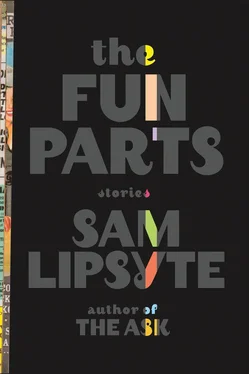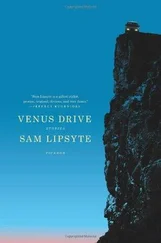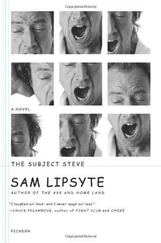The light trickling through the leaded windows was certainly pale. This Public Image Limited business was a horrific mistake. Lydon had gotten it right the first time. The Man Who Killed the Idea of Tanks in England had gotten it wrong, stood there on that muddy field, snorted in Mr. Simms’s expectant face.
“Won’t do. Won’t do at all.”
Was he supposed to be some seer, then? A Delphic oracle? How could he predict such intractability, the endless trenches, all that wire, the Boche guns shredding so many tender poets? Surely he should be forgiven for killing the idea of tanks in England. Others, after all, had revived the idea, fetched it from conceptual purgatory. A little late to save the poets, perhaps, but there were too many anyway. Besides, who is to say they would not have roasted inside those infernal kettles?
Then again, with a jump on the job, England might have had a whole fleet of armored poet-preserving machines. Maybe one would have rolled over Corporal Hitler in No Man’s Land, saved everyone a considerable inconvenience. Still, would that have been worth the price of watching Rupert Brooke die of prostate cancer?
It was the American Century, after all, or so the Americans kept proclaiming, and maybe they had a point. Though not much of a book fancier, the Man Who Killed the Idea of Tanks in England had always been keen on the Yanks. His favorite was the golden lush from Minnesota. Gatsby was tops. A secret part of him had always wished he could write such a bloody good novel. Or better yet, be the subject of a tale by such a blazing talent. But the story of the Man Who Killed the Idea of Tanks in England would probably never have occurred to Fitzgerald. The Man Who Killed the Idea of Tanks in England had spent most of the so-called Jazz Age pretending he had not killed the idea of tanks in England. It was not much of a story, was it?
It could very well have been that the Man Who Killed the Idea of Tanks in England was actually one hundred and twenty-seven years old. There were no papers pertaining to his birth. A bastard, he was, born in a hedgerow to a chambermaid. His father, the fake earl, had been kind enough to pay for schooling, after which the army seemed a natural choice. Leap a Sudanese boulder, charge some Boers, you might dodge certain questions of lineage. You might rise through the ranks until you have won enough medals to be asked your opinion of the idea of tanks in England.
Be ready, by God.
Now the Man Who Killed the Idea of Tanks in England heard the sound of an engine revving out past the garden. The Man Who Killed the Idea of Tanks in England peered out the parlor window. It was that damned Peasley, the groundskeeper, on his new contraption, the mechanized lawn mower. Peasley had eaten up a good deal of the grounds budget with that pretty mechanical toy, which, come to think of it, is what Lord Kitchener, the old field marshal, dubbed the Simms car.
So it was not only the Man Who Killed the Idea of Tanks in England who killed the idea of tanks in England!
The Man Who Killed the Idea of Tanks in England could remember when men cut grass with curved blades on the ends of sticks. What were they called again? What were those blades that seemed to whirl on the ends of sticks called? Now came Peasley riding high up on his little mower like a modish tank general, some arrogant Total War twit.
Confound him.
The Man Who Killed the Idea of Tanks in England let his dear dead wife’s shawl slip from his lap. He hobbled out to the garden gate. Peasley chugged by on his mower, waved.
“Won’t do!” called the Man Who Killed the Idea of Tanks in England. “Won’t do at all!”
He noticed that Peasley wore some odd plastic muffs on his ears and probably had not heard him.
“Hello there!” he called, moving past the gate and onto the lawn. Peasley rounded a tree, headed straightaway at the Man Who Killed the Idea of Tanks in England. Could Peasley be driving with his eyes shut? The idiot looked lost in reverie. The Man Who Killed the Idea of Tanks in England stood motionless. His old bones, his rotted legs felt staked to the earth. What he would not give now for Hal, his old Boer War mount. Not a kingdom, though. Too late for that.
“Peasley! Peasley!”
One could not say his life flashed before his eyes. His life had been too long. The lawn mower was too slow, and clunky. He saw things, though, toys from his boyhood, tin lancers and hussars and cuirassiers, the gilt-edged pages of his beloved adventure books. He saw the nibs of examination pens, and the body of the girl who would become the woman who would become his wife, in moonlight. He saw himself and others in uniform, on parade, on maneuvers, and later on pallets, gurneys. He saw veldtgrass and Sudanese dirt and trench mud drying on his boots. He saw his mother in her maid’s kit, and his father, far off in a sun-buzzed meadow, a quail gun in the crook of his arm. He saw the garish pink-and-green sleeve of Never Mind the Bollocks , his own palsied hand pawing at the precious vinyl inside.
It had been too bloody long, this life, everything hinging on one decision made when he was just a youngish fool with too many ribbons, too much fringe.
“Won’t do,” said the Man Who Killed the Idea of Tanks in England, and fell to his ruined knees. Peasley, eyes shut, recollecting a childhood fishing trip he had taken with his maternal grandfather, a German who had helped develop mustard gas for the kaiser, drove down upon the Man Who Killed the Idea of Tanks in England, the blades beneath the mower’s carriage whirling like, that’s it, scythes.
Nobody wanted my woe. Nobody craved my disease. The smack, the crack, the punch-outs and lockdowns, all those gun-to-my-temple whimpers about my dead mother and scabby cat — nobody cared anymore. The world had worthier victims. Slavers pimped out war orphans in hovels hung with rat-chewed velveteen. Babies starved on the desert floor.
Once, my gigs at the big-box bookshops teemed with the angry and ex-decadent, the loading-bay anarchists and hackers on parole, the meth mules, psych majors.
Goth girls, coke ghosted, rehabbed at twelve and stripping sober, begged for my sagas of degradation, epiphany. They pressed in with their inks, their dyes, their labial metals and scarified montes, cheered their favorite passages, the famous ones, where I ate some sadistic dealer’s turd on a Portuguese sweet roll for the promise of a bindle, or broke into a funeral parlor and slit a corpse open for the formaldehyde. My fans would stomp and holler for my sorrows, my sins, sway in stony reverence as I mapped my steps back to sanity (the stint on a garbage truck, the first clean screw), or whatever semblance of sanity was possible in a world gone berserk with misery, plague, affinity marketing.
I had what some guy at a New Paltz book café called arc. You can’t teach arc, he told me. Nobody’s born with it, either. I stood for something. My finger lingered on the somehow still-flickering pulse.
I had a good run. Bang the Dope Slowly and its follow-up, I Shoot Horse, Don’t I? , sold big. I bought a loft, married Diana, the lovely Diana, who’d stood by in the darkness, my “research” years. My old man, the feckless prick, even he broke down and vowed his love. But as a lady at a coffee bar in Phoenix put it, what goes up can’t stay up indefinitely because what’s under it, supporting it, anyway?
There are wise women in Arizona.
* * *
It was here in New York City that I first noticed signs of my decline. Standing at the lectern under those harsh chain store kliegs, regaling the crowd with the particulars of a scam I used to run on Alzheimer’s patients from a clinic near my squat, I heard a voice spear down from the balcony.
Читать дальше












